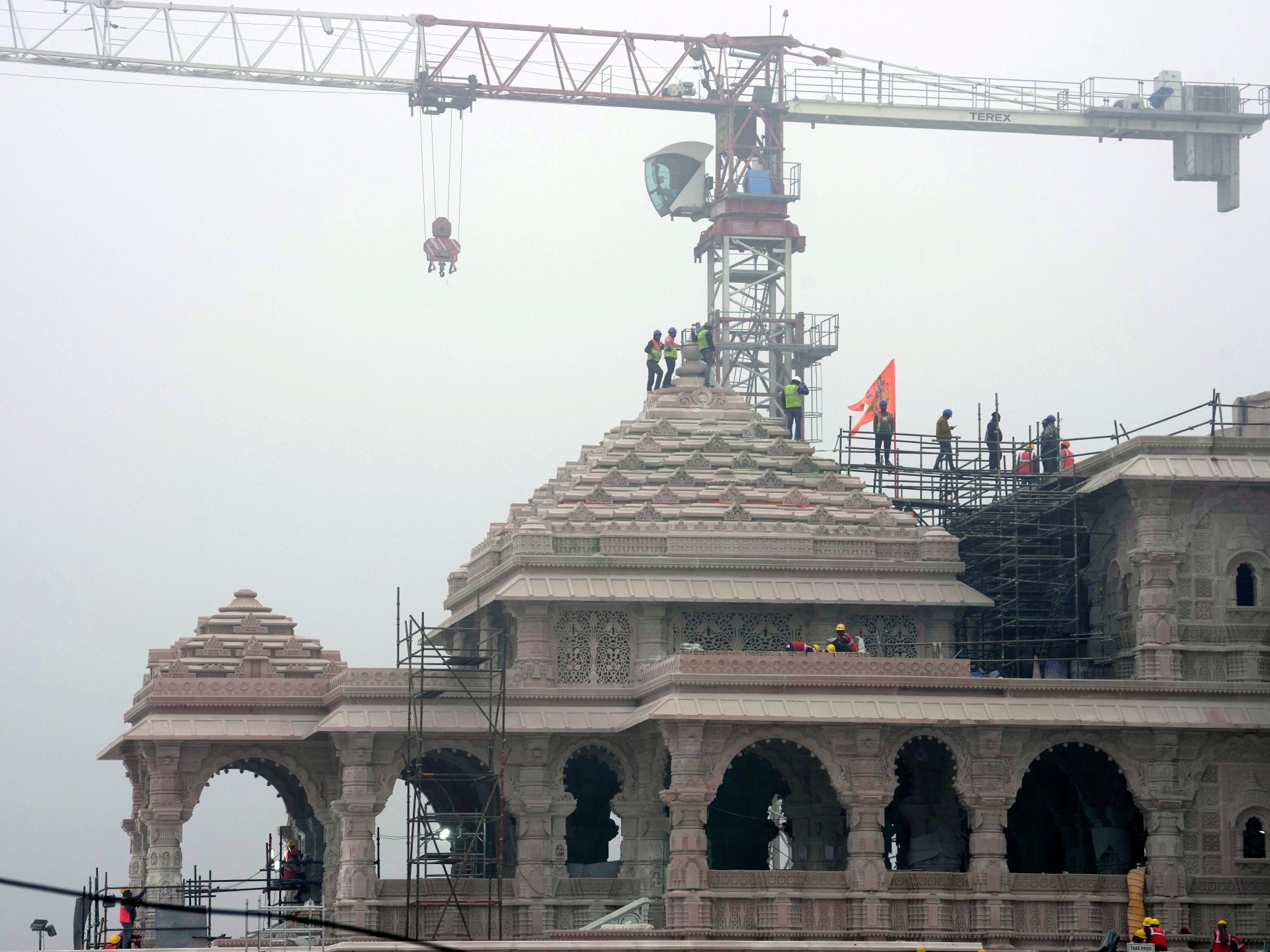With controversial temple launch, Modi to start 2024 India re-election bid | Politics
Ayodhya, India – For hundreds of years, a journey to Ayodhya for many Hindu pilgrims meant a walk down narrow lanes to the Hanuman Garhi Mandir, a temple honouring Hanuman, the monkey god. Now a wide street leads to the shrine, with shops on both sides selling sweetmeats as offerings to the deity. Hanuman Garhi has a brooding dark dome, and the temple has a new coat of red and saffron paint. Its young priests are sprightly and quick.
But the 10th-century temple in the northern Uttar Pradesh state is no longer the main attraction here. Some 500 metres (547 yards) away, a brand new, as yet incomplete, construction has taken hold of India’s attention.
Long queues of young men and women chant “Jai Shri Ram” (Victory to Lord Ram) as they try to enter the complex, guarded zealously by police officers. One policeman helpfully tells them to deposit their mobile phones in a safe. Inside, craftsmen work on large horizontal prefab structures. Others chisel away painstakingly at pillars and rock features. It is not noisy, but there is a buzz of construction activity everywhere.
The queue leads to a statue of Ram, which will give way to a new one that has been selected in a nationwide competition and will be moved to the venue on January 17. Meanwhile, workers race against time, repairing the steps of a nearby baoli or step-well, and building accommodation for pilgrims.
They have a deadline to meet – January 22 – by when they must build enough of the Ram Mandir for Prime Minister Narendra Modi to inaugurate it, amid nationwide frenzy around the project fed and fuelled by the governing Bharatiya Janata Party (BJP) and its allied Hindu majoritarian outfits.
Built on the ruins of a mosque of the 16th century, Babri Masjid, which Hindu activists demolished in December 1992, the temple is close to the site that is believed by many Hindus to be the birthplace of Lord Ram, a personification of the victory of good over evil. In 1990, the BJP and quasi-religious bodies like Vishwa Hindu Parishad (VHP) launched a massive campaign demanding that a temple be built where the mosque stood, culminating in the physical assault on the existing shrine two years later. The movement catapulted the BJP, which had won only two out of the 543 seats in the lower house of India’s parliament, to national centre stage.
Now, the semi-constructed temple is poised to serve as the backdrop for what many analysts and opposition leaders say is effectively the launch of Modi’s campaign for re-election in the 2024 national polls, expected to be held between March and May.
‘No one disputes the importance of the temple’
To many Ayodhya residents, and those visiting the temple town, it is a moment to cherish.
“We are very happy with the temple,” said Daudas, the chief priest at Hanuman Garhi, adding that it would be good for the economy of the city too. Deepak Gupta, a shopkeeper near Hanuman Garhi, agreed and said many tourists were already visiting the city to see the construction that has been under way. More pilgrims would come, he said, after the January 22 consecration.
At a petrol station on his way from Lucknow, the capital of Uttar Pradesh, to Ayodhya, businessman Dalip Chopra acknowledged that political reasons might be driving the project. But, he added, “No one disputes the importance of the temple and the fact that it has to be built.” Had he ever prayed to Ram before? “We will do it now,” he said, defiantly.
Vijay Mishra, an astrologer and priest who divides his time between Lucknow and Ayodhya, said a brand new international airport and a railway station, both inaugurated by Modi on December 30, “could make many bigger cities envious” of Ayodhya.
Politics or religion?
Across Ayodhya, flags of the governing party lazily flutter alongside banners of a victorious Ram and an angry Hanuman, reinforcing the idea that the temple is a gift to India’s Hindu majority from the BJP.
Only 6,000 specially chosen invitees will be allowed in on January 22, and the security blanket, it appears, is aimed at preparing for the possibility of excited crowds trying to enter. On October 30, 1990, the state police had fired on devotees and religious workers, known as karsevaks, as they tried to force their way to the site. At least 50 people were killed. The party in power then in Uttar Pradesh is now in opposition. And a BJP government in the state will not want even the possibility of a repeat. “What would happen if thousands come to Ayodhya,” wondered Shyambabu, owner of a sweetmeat shop in front of the Hanuman Garhi temple.
Besides Modi, others who will be part of the consecration include Mohan Bhagwat, chief of the Rashtriya Swayamsevak Sangh (RSS), the BJP’s ideological parent; Uttar Pradesh Chief Minister Yogi Adityanath and a priest chosen to perform the ceremony.
That the inauguration is taking place before the temple is complete, and that it focuses on Modi — who is not from the Brahmin or priestly community — has upset some Hindu gurus. Four of the most prominent seers, called the Shankaracharyas, are boycotting the event.
Also skipping the event is the opposition Congress party, which described the inauguration as a political show rather than one meant to honour Ram. India’s mostly pro-government mainstream media has savaged the Congress over its decision — the BJP and its allies portray India’s Grand Old Party as anti-Hindu and focused on the interests of Muslims.
But political analyst Harish Khare said the Congress decision was a reflection of the leadership of the party’s current president, veteran leader Mallikarjun Kharge, who in 2022 took over from the Nehru-Gandhi family that has controlled the Congress for much of the past 75 years.
“Unlike the Gandhis, the new Congress president will not allow himself to be on the backfoot on this matter,” Khare said. “Mr Kharge has brought in new clarity that the new president would not be part of any congregation in which the RSS chief would be a major presence.”
The Congress is the hub around which the opposition alliance, called INDIA, has been built. With elections coming up, Congress cannot be seen as complicit in a ceremony orchestrated by the party it wants to replace.
For the BJP, meanwhile, the Congress decision is a chance to reinforce its narrative that it alone cares about the country’s Hindus. On January 22, as the Ram Mandir is consecrated, a re-election campaign too, will in effect be inaugurated.
Check out our Latest News and Follow us at Facebook
Original Source






